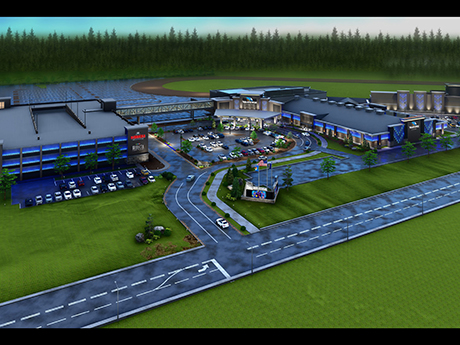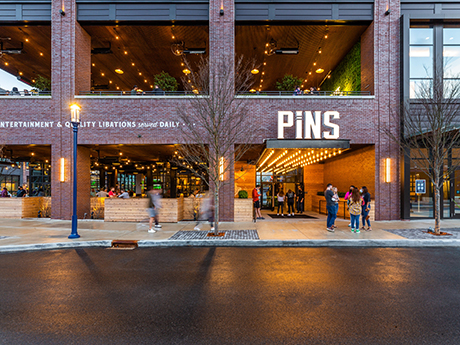From pickleball to gaming to live music, landlords create hot new combinations that appeal to a variety of consumers and boost sales.
Sports and entertainment destinations offer several benefits to retail properties — they boost foot traffic, encourage consumers to linger, complement traditional retail and provide opportunities for refilling vacancies. Pickleball, gaming and music venues are some of the most prolific concepts in today’s experiential marketplace.
“These users draw consumers into a development,” says Tim Katt, managing director of Transwestern Real Estate’s sports and entertainment advisory group. “Their ability to take up large, often dormant spaces and activate them is undeniable.”
Industry professionals emphasize that sports and entertainment tenants play a complementary role for traditional retailers.
Steven Mueller, senior project manager with St. Louis-based HDA Architects, says that mixing entertainment concepts like pickleball with attached or adjacent restaurants is an “especially hot combination.” The idea is to entice guests to spend more time and money in a single location.
“Entertainment is complementary to retail in the sense that you get cross-pollination between tenants,” says Beau Arnason, executive vice president of asset performance at Columbus, Ohio-based Steiner + Associates. “You may come to a lifestyle center for an entertainment experience, but stop for food, drinks and shopping along the way.”
Properly curating entertainment uses within retail and food-and-beverage spaces provides the opportunity to appeal to a broader demographic of consumers, says Arnason. The retail tenants that surround a certain entertainment concept should cater to the same demographic.
Steiner + Associates handles leasing and management of Easton Town Center in Columbus, Ohio. The retail destination appeals to a wide range of age groups with entertainment offerings such as a Legoland and AMC Cinema for families; duckpin bowling and pinball concept PINS Mechanical Co. for both family-friendly and nighttime entertainment for adults; The Escape Game for families and teens; and nightlife entertainment for adults such as Ivan Kane’s Forty Deuce Burlesque Speakeasy & Pizzeria and Funny Bone Comedy Club.
The latest addition is PBR Cowboy Bar + Smokehouse, which opened an 8,400-square-foot space equipped with an outdoor patio, stage and mechanical bull.
“We call shopping centers retail real estate, but what they really are is consumer-facing real estate,” says David Donato, chief operating officer of Baltimore-based Continental Realty Corp. “What an entertainment user loves about shopping centers is the same thing a retailer loves — signage and branding opportunities, easy access, ample parking and traffic drivers from surrounding tenants.”
Pickleball craze
The proliferation of pickleball venues across the country shows no sign of slowing down. As of January 2024, there were 11,885 locations encompassing 50,003 courts nationwide, according to USA Pickleball. The sport is played on a badminton-sized court with the net set to a height of 34 inches. Players utilize a perforated plastic ball and paddles about twice the size of ping-pong paddles.
USA Pickleball attributes the sport’s “passionate following” to its friendly, social nature and multi-generational appeal.
Continental Realty Corp. inked a 27,333-square-foot lease with The Picklr at its Fox River Commons shopping center in Naperville, Illinois. The Utah-based tenant intends to open roughly 500 pickleball venues across the country within the next several years. When leasing space to pickleball users, Donato says it’s important to ensure there is wide enough column spacing to fit the desired number of courts.
Transwestern is the exclusive real estate provider for Picklemall, an indoor pickleball concept that capitalizes on vacant mall space. Last fall, the tenant leased 46,000 square feet for its flagship location in the northern Chicago suburb of Vernon Hills, Illinois. Picklemall aims to establish 50 facilities nationwide in the next couple of years. The Vernon Hills location takes over space formerly occupied by Toys ‘R’ Us.
“Paddle sports properties have experienced meteoric growth due to the influx of institutional capital supporting the growth of pickleball and padel,” says Transwestern’s Katt. “With adequate column spacing and ceiling height, the capital expenditure for paddle sport concepts can be relatively low, while the unit economics are very compelling based on a court rental model. The risk for landlords is relatively low since paddle sport tenants often do not require a lot of tenant improvements.”
Padel is a newer concept to the U.S. marketplace. Originating in Mexico, the sport is a mix between tennis and squash. Douglas Rendleman, president of Chesterfield, Missouri-based A.J. Brown Inc. Construction Services, says padel is “the next big phase.”
Rendleman’s firm recently completed Padel + Pickle, an indoor padel and pickleball facility totaling 42,116 square feet in the St. Louis suburb of Olivette, Missouri. The project involved the conversion of a former whiskey distillery and manufacturing facility into six padel courts and eight pickleball courts along with a bar, lounge areas, big-screen televisions, locker rooms and a pro shop.
Padel + Pickle offers clinics, private lessons, leagues, court rentals, open play and tournaments for all skill levels. The company’s ownership, a group of retired professional squash players, aims to build more facilities in other states.
While outdoor sports like golf flourished during the pandemic, the costs associated with golf memberships are not wallet friendly, emphasizes Rendleman. “A club like [Padel + Pickle] gives you a social outlet that’s nowhere near as expensive and is within a good portion of the population’s pocketbook.”
Gaming on the rise
The global casino gambling market size, in terms of gross gaming revenue, is expected to grow from $150.3 billion in 2024 to $191.7 billion by 2029, according to a report from ResearchAndMarkets.com. As governments ease restrictions on gambling to boost tourism and generate revenue, the casino industry has expanded. The construction comes in the form of new casinos as well as growth of existing ones.
PENN Entertainment recently broke ground on the $185 million Hollywood Casino Joliet at RockRun Collection in Joliet, about 35 miles southwest of Chicago. The casino will anchor RockRun Collection, a 1 million-square-foot mixed-use project being developed by Peoria, Illinois-based Cullinan Properties.
The land-based casino will feature roughly 850 slots and 44 live table games, including a baccarat room, retail sportsbook, bars and restaurants.
RockRun Collection is slated to include 500,000 square feet of retail and restaurant space, an outdoor amenity area and entertainment space in addition to multifamily, hospitality and office uses.
The development of entertainment spaces provides benefits via economic impact and community engagement, says Kathleen Cullinan Brill, executive vice president and director of business development and strategic partnerships with Cullinan Properties. She cites job creation, tourism and infrastructure development as some of the main economic benefits.
In response to the question of whether there is risk of the casino gambling business becoming oversaturated, Brill says that consumers crave an in-person experience as opposed to online gambling. She also emphasizes how a casino project like the one in Joliet is attractive to consumers with its mixed-use setting.
Minneapolis-based Kraus-Anderson Construction is currently underway on a WarHorse Gaming facility in Omaha, Nebraska, that will feature 1,300 slots and 20 table games. The firm is also completing a $95 million renovation of the 4 Bears Casino & Lodge in New Town, North Dakota.
Chicago-based McHugh Construction served as the general contractor for FanDuel Sportsbook, a 13,000-square-foot sports betting venue that opened in late 2022 at the United Center, home of the Chicago Bulls and Chicago Blackhawks. The space includes a two-story lounge equipped with a high-definition video wall, interactive kiosks and sports wagering technology.
“Entertainment spaces are often built within existing, high-traffic venues,” says Andrew Totten, vice president of McHugh. “We have completed several entertainment destinations at United Center and Navy Pier that required working on busy, active sites with events occurring nearly every day.”
For these types of projects, McHugh works to minimize the impact on visitors and staff, putting up barricades or temporary walls to separate construction activity from the public. The firm also schedules construction activities during the evening to limit the impact of noise, dust and materials deliveries.

Music to our ears
Despite inflation and soaring ticket prices, Americans continue to spend on live entertainment. The consensus is that there is still pent-up demand for in-person experiences after the pandemic. In 2023, Americans spent $48.1 billion on live entertainment, excluding sports, according to the U.S. Bureau of Economic Analysis. The figure marks a 27 percent increase over 2022.
“I believe that we are in an era where experiences are valued over physical goods, which supports the growth of entertainment retail,” says Mervat Berry, advisor with MDL Group/CORFAC International in Las Vegas. “Despite economic headwinds and consumers growing more selective, venues that offer a unique and compelling value are thriving.”
McHugh recently completed the $30 million restoration of the historic Ramova Theatre in Chicago. The long-shuttered, single-screen cinema is now an 1,800-person concert hall. The 36,000-square-foot project also included the build-out of space for Other Half Brewing, an independent craft brewery and taproom; Ramova Grill, an 18-seat diner; and Ramova Loft, a second-floor, 200-person event venue.
Totten says it’s important to create venues that attract both guests and performers. On the Ramova project, McHugh and the developer talked with several well-known artists to gauge their input on the design and construction.
HDA served as the architect for both The Hub STL and Armory STL, two recent entertainment projects that infused life into formerly empty or slowing retail centers. The Hub STL is an outdoor entertainment space that serves as the centerpiece of The District of St. Louis, a larger entertainment development that is devoted to live music, food and beverage concepts and retail space.
The Hub STL features a pavilion, large LED screen, professional sound system and a 70-foot stage for performances. The District is also home to The Factory, a 52,000-square-foot indoor concert venue with seating for approximately 3,000 people.
“It’s important to create a center hub or gathering area within the entertainment space and then surround that area with restaurants, entertainment options and additional retail,” says Mueller. “The retailers only need to purchase space required for their core business services, yet they get the advantage of a large gathering space that draws in more customers.”
Armory STL is the largest indoor entertainment space in St. Louis, according to Patrick Holleran, senior principal with HDA. The 250,000-square-foot development features a 60-foot stage to host live entertainment every weekend, as well as monthly national and regional touring acts. In addition, the space features six bars, 40 interactive games, a two-story slide, dozens of TV screens and VIP event areas.
“American consumer discretionary spending trends show that people are still finding a way to work in fun and play throughout their daily lives,” says Holleran. “Discretionary spending remained remarkably resilient throughout 2023, despite prolonged inflation and high interest rates.”
Holleran is not concerned about the impact of inflation on discretionary spending moving forward.
“Americans understand we’ve been in the current economic climate for a period of time, and there’s light at the end of the tunnel,” he says. “Americans are known for enjoying the experiences of life, and we’re resilient enough to make sure we maintain this lifestyle. Sports and entertainment venues are at the core of what our society enjoys most.”
— Kristin Hiller
This article was originally published in the May 2024 issue of Shopping Center Business magazine.


